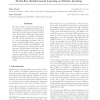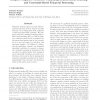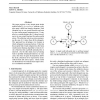473 search results - page 16 / 95 » Optimal policy switching algorithms for reinforcement learni... |
ICML
2009
IEEE
14 years 8 months ago
2009
IEEE
We cast model-free reinforcement learning as the problem of maximizing the likelihood of a probabilistic mixture model via sampling, addressing both the infinite and finite horizo...
ATAL
2003
Springer
14 years 28 days ago
2003
Springer
Much emphasis in multiagent reinforcement learning (MARL) research is placed on ensuring that MARL algorithms (eventually) converge to desirable equilibria. As in standard reinfor...
NECO
2010
13 years 6 months ago
2010
Most conventional Policy Gradient Reinforcement Learning (PGRL) algorithms neglect (or do not explicitly make use of) a term in the average reward gradient with respect to the pol...
ICML
2004
IEEE
14 years 8 months ago
2004
IEEE
Reminder systems support people with impaired prospective memory and/or executive function, by providing them with reminders of their functional daily activities. We integrate tem...
ICML
2003
IEEE
14 years 8 months ago
2003
IEEE
The paper explores a very simple agent design method called Q-decomposition, wherein a complex agent is built from simpler subagents. Each subagent has its own reward function and...



